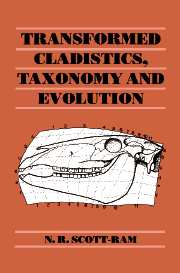Book contents
1 - Theoretical and descriptive attitudes in taxonomy
Published online by Cambridge University Press: 21 October 2009
Summary
Introduction
Over the years, the taxonomic schools have encountered several recurrent problems. Both the evolutionary systematists and phylogenetic cladists confronted problems over the accurate storage and retrieval of information in classifications, while the pheneticists and transformed cladists concentrated on ways of reducing bias in classification construction. These problems relate to the limits of the aims and methods of each school, and can be situated in a wider domain of discussion, some of which has relevance to the philosophy of science. An important distinction in this respect concerns internal and external issues.
Internal issues
These concern questions that have arisen directly from the debate in taxonomy over the past twenty years, and are primarily concerned with the limits in the aims and procedures of classification. In pursuing these limits, several philosophical problems are raised with respect to the following questions.
(A) How much theoretical information can classifications carry?
This refers specifically to the finished product, a classification.
(B) How much theory can be eliminated in the construction of classifications?
This concerns the elimination of theoretical presuppositions indirectly involved in application to classifications, e.g. the results of comparative morphology. The overall emphasis is on the way in which a classification is constructed with regard to the unloading of theory in any given methodology. In other words, how much is classification construction the servant of some theory? How far can bias be eliminated from a given method?
(C) How is theory involved in the interpretation of a classification?
Central to this question is the relation between a classification and the underlying theory, and whether or not classifications always require explanatory appeal to a particular theory.
- Type
- Chapter
- Information
- Transformed Cladistics, Taxonomy and Evolution , pp. 9 - 38Publisher: Cambridge University PressPrint publication year: 1990



